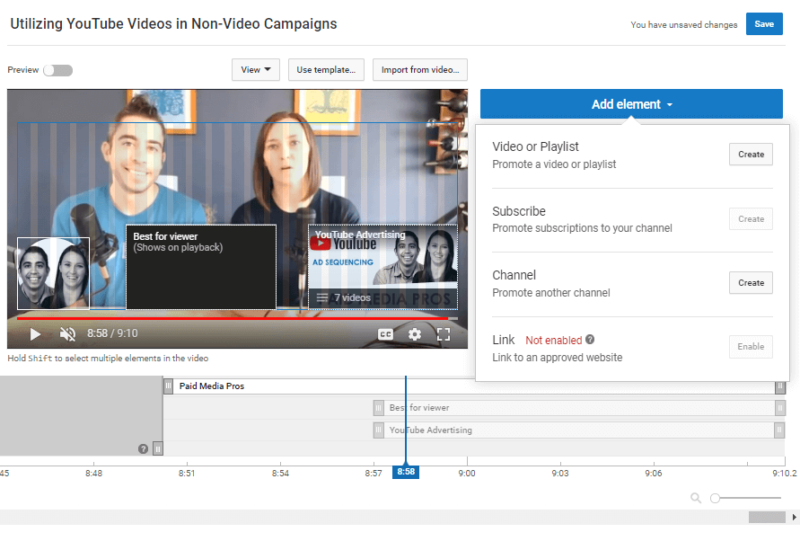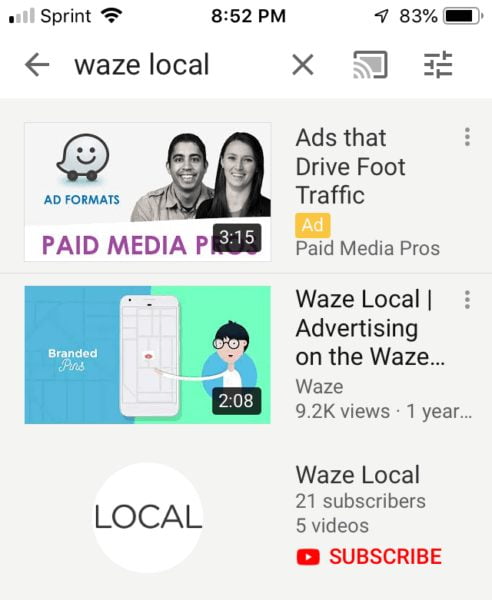Typically, when I talk about video campaigns in Google Ads, I talk about TrueView in-stream ads. These are the pre-roll ads that play before or during the video a user actually intended on watching. While I recommend these ads to almost anyone interested in running ads on YouTube, TrueView video discovery ads could be a better fit in certain cases. I want to show you why discovery ads could be either a better fit for your account or even a great complement to the campaigns you are already running.
Video discovery ads can capitalize on deeper intent
Many video marketers may say that custom intent audiences for YouTube are the deepest form of targeting in Google Ads video campaigns to capitalize on user intent. While I LOVE custom intent audiences and use them all the time, I have to disagree with that statement. PPC marketers (again guilty of this one) talk about how search is the deepest form of intent in digital marketing. Well, people can search on YouTube too!
Yes, we can use audience targets for our video discovery ads, but we can also choose to target by keywords that contextually relate to certain videos or channels. Advertisers running TrueView video discovery ads can also update their campaign settings to only show their ads on YouTube search results pages (like what you see above). This way you are only showing your discovery ads to users actively searching for videos on specific topics. You won’t get the volume like other video ad formats in Google, but your placements can be spot on a lot of the times.
Discovery ads are great for advertisers with content not suitable for in-stream
With an in-stream ad, we are disrupting a user’s experience. They were not on YouTube to watch your ad. They were there to watch a music video, a cat video, a Ted talk, etc. So our in-stream ads have to be more like TV commercials. If you are using the skippable ads, you need to make sure you are capturing the user’s attention within the first five seconds otherwise they will skip your ad. With TrueView video discovery ads, the user chooses to watch your video. If they have already shown an interest in your content, you can elect to try and keep that user engaged as long as possible with longer video content.
Let me explain a real scenario I had with a client this year. This client wanted to promote a video they made which was an interview with a specific celebrity. We already had our list of custom audiences about this celebrity ready as well as layers of other audiences that fit perfectly with this demographic. The decision to make this campaign a TrueView video discovery campaign was pretty clear. Why? The answer is clear for a couple of reasons.
- The video was over 32 minutes long. No joking. This length of the video is highly unrecommended for an in-stream ad.
- The format of the video content was not really engaging. It really was the interviewer and the celebrity, sitting in chairs, talking about one cause. The content was great, but it took much longer than five seconds for someone to figure it out and most likely they wouldn’t have skipped the ad anyway. While free impressions are great, we wanted people to engage.
You can see in the image above, I’m sharing the actual stats for this campaign. If these percentages were for a TrueView in-stream ad, I wouldn’t be proud of them. But remember, the video was two people sitting in chairs and talking for over half an hour. That being said we had almost 7% of users clicking on the ad watching at least eight minutes of the video. We had 1.53% of users clicking on the ad watching all 32-plus minutes. Not bad for a couple of cents per view. So if you have longer videos that won’t work for an in-stream ad, try it out as a discovery ad instead.
We can use discovery ads to build your engagement audiences
When running TrueView in-stream ads, advertisers can add features like companion banners and call-to-action extensions to drive users to specific landing pages. With TrueView video discovery, we do not have those options. So if we can’t drive users to our landing pages directly from our discovery ads, what do we do? Remember after a user clicks on your discovery ad, they go straight to the video watch page. Hopefully, your targeting is hitting the right audience, and you are keeping those users engaged to the end. Because if a user reaches the final seconds of your video, you can set up end screens to encourage additional engagement.

In the image above, I have gone ahead and added (from left to right) subscribe, best for viewer video, and playlist end screens to the end of this video. So when users get to the last twenty seconds, I can encourage them to either subscribe to my channel or watch other videos. No hard sell. All I am asking for is the continuation of these users’ attention. How does this affect PPC? Good question.

In Google Ads, we can add the Earned Action columns. Google tracks when users watch additional videos, like your videos, share your videos, subscribe to your channel, and add your videos to a playlist after clicking on your video ads. Best news yet is all of these additional actions are FREE! If your videos are engaging a lot of users and building a good amount of earned actions, then you need to head to the Audience Manager in Google Ads.

When you create audiences from YouTube users, you have the option to create audiences from earned action sources. (For clarification, these audiences include more than earned actions after ads but all actions. E.g. All recent subscribers not just the ones who watched an ad first). But we can take these YouTube user audiences to use for our remarketing campaigns in YouTube, Display or Search. While we may not be able to drive traffic to our landing pages, we can use video discovery ads for the top of the funnel and use those engagement audiences for next-step remarketing campaigns to guide that user further down the funnel to eventual conversion.
Final Point
It’s easy to lean towards the video ad format that will give you consistent, free views, but TrueView video discovery ads are also valuable. They just take a different approach to understand the user experience and how we execute a strategy that is helpful to your business goals. TrueView video discovery ads are not meant to replace your in-stream campaigns. They are meant to be a worthy complement to capitalize on a different viewer with a different intent when consuming video content on YouTube.
Opinions expressed in this article are those of the guest author and not necessarily Search Engine Land. Staff authors are listed here.

